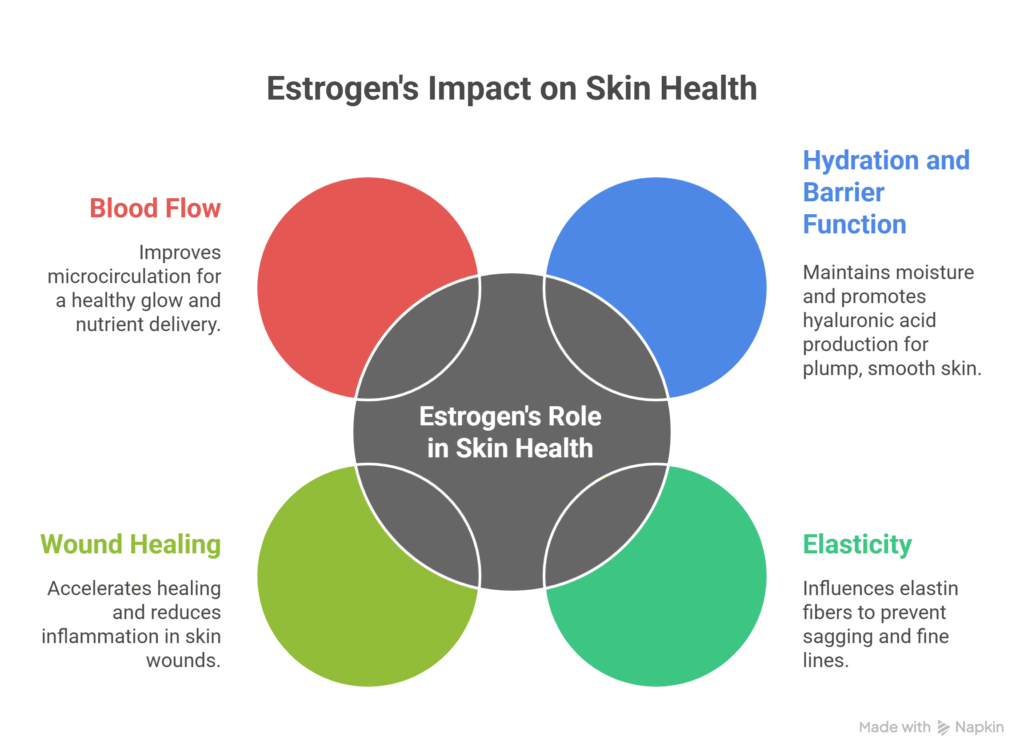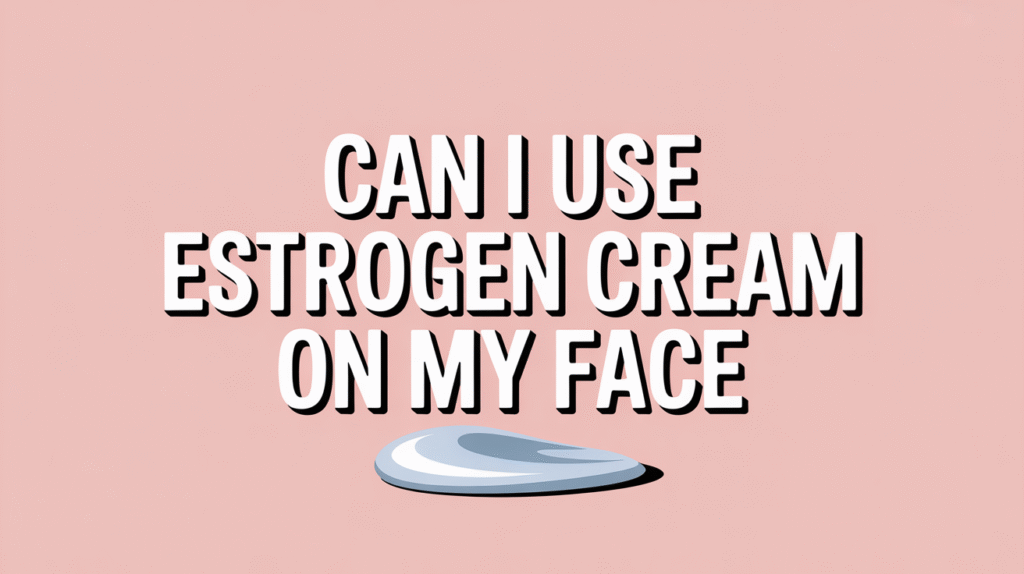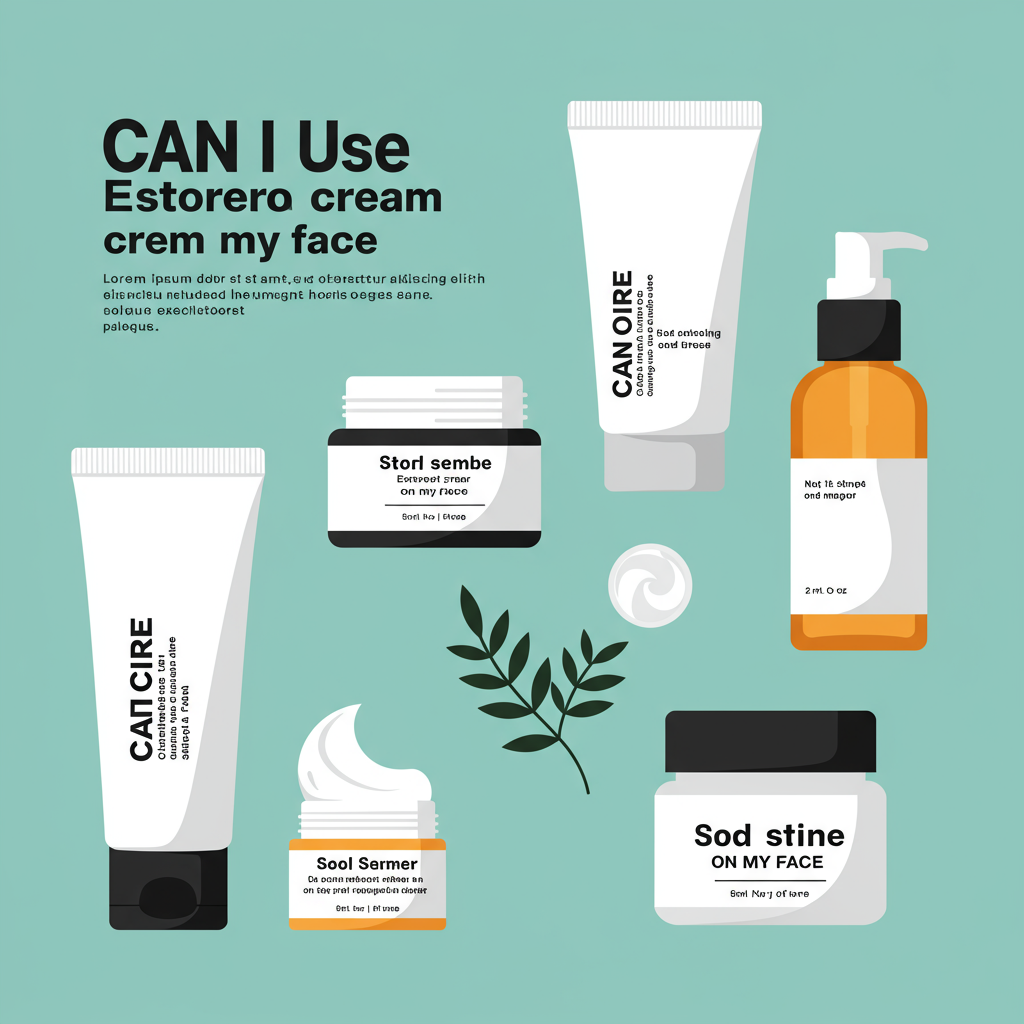The quest for youthful, radiant skin often leads us down many paths, exploring a myriad of ingredients and treatments. In this pursuit, a question that frequently surfaces, particularly among those experiencing hormonal changes, is: can I use estrogen cream on my face? The idea of harnessing the power of hormones directly for anti-aging benefits can seem appealing, given estrogen’s known role in maintaining skin health. However, the application of prescription hormonal creams, like estrogen cream, to the delicate skin of the face is a complex topic that warrants careful consideration and, most importantly, professional medical advice.
This comprehensive guide will delve into the science behind estrogen’s impact on skin, clarify the distinctions between different types of estrogenic products, explore the potential benefits and significant risks associated with using estrogen cream on your face, and ultimately, provide safer, evidence-based alternatives for achieving your skincare goals. Understanding these nuances is crucial before considering any self-treatment involving hormonal products, ensuring both your skin’s health and your overall well-being are protected.
The Role of Estrogen in Skin Health
Estrogen, a primary female sex hormone, plays a far more extensive role in the body than just reproductive function. It significantly influences various physiological processes, including the health and appearance of our skin. Understanding its natural impact helps explain why many wonder about its topical application for anti-aging.
How Estrogen Impacts Your Skin

Throughout a woman’s life, estrogen contributes to several key aspects of skin vitality:
- Collagen Production: Estrogen stimulates the production of collagen, the most abundant protein in the skin responsible for its strength and elasticity. Higher estrogen levels typically correlate with thicker, firmer skin.
- Hydration and Barrier Function: It helps maintain the skin’s natural moisture barrier and promotes the production of hyaluronic acid, a powerful humectant that draws and holds water in the skin. This leads to better hydration, plumpness, and a smoother texture.
- Elasticity: By influencing elastin fibers, estrogen contributes to the skin’s ability to stretch and recoil, preventing sagging and fine lines.
- Wound Healing: Estrogen has been shown to play a role in accelerating wound healing and reducing inflammation.
- Blood Flow: It can improve microcirculation in the skin, contributing to a healthy glow and efficient nutrient delivery.
Estrogen Decline and Skin Aging
The noticeable decline in estrogen levels, particularly during perimenopause and menopause, has a profound impact on skin health. As estrogen diminishes, women often experience:
- Decreased Collagen: A significant reduction in collagen synthesis, leading to thinner skin, increased laxity, and the formation of wrinkles.
- Dryness and Dehydration: Impaired barrier function and reduced hyaluronic acid content result in drier, rougher skin that is more prone to irritation.
- Loss of Elasticity: The skin becomes less resilient, contributing to sagging, especially around the jawline and neck.
- Slower Wound Healing: The skin’s ability to repair itself diminishes.
These visible changes are precisely why the idea of supplementing estrogen topically for facial skin becomes so appealing, prompting the question, “can I use estrogen cream on my face?”
Can You Really Use Estrogen Cream on Your Face? The Medical Stance
While the benefits of estrogen for skin health are clear, the question of whether one can or should apply estrogen cream directly to the face for anti-aging is met with significant caution from the medical community. The short answer is: generally, no, not without explicit medical supervision and a prescription for a specific purpose.
Prescription Estrogen Creams: What They Are For
Most estrogen creams available are prescription-only medications designed for specific medical conditions. They are primarily used for:
- Hormone Replacement Therapy (HRT): Systemic estrogen therapy (pills, patches, gels, or creams applied to specific body areas) to manage menopausal symptoms like hot flashes, night sweats, and bone loss.
- Vaginal Atrophy: Localized estrogen creams or inserts are prescribed to treat vaginal dryness, itching, and discomfort caused by estrogen deficiency. These are formulated for local action in sensitive mucosal tissues.
These products are not formulated or approved for cosmetic anti-aging purposes on the face. Their use is carefully monitored by healthcare providers due to the potential for systemic absorption and associated risks.
Risks of Off-Label Facial Use

Applying a prescription estrogen cream to your face without medical guidance carries several significant risks:
- Systemic Absorption: Skin, especially the thin facial skin, is highly absorbent. Applying estrogen cream to your face can lead to systemic absorption of the hormone into your bloodstream. This means you could be inadvertently giving yourself a dose of hormone replacement therapy, potentially leading to hormonal imbalances that have not been prescribed or monitored by a doctor.
- Hormonal Side Effects: Unregulated systemic estrogen can cause a range of side effects, including:
- Breast tenderness or swelling
- Nausea
- Headaches
- Mood swings
- Uterine bleeding or spotting (in women with a uterus)
- Increased risk of blood clots, stroke, heart disease, and certain cancers (like endometrial or breast cancer) in susceptible individuals, especially without concomitant progesterone, if a uterus is present.
- Skin Irritation: The inactive ingredients in prescription creams may not be suitable for facial use and could cause irritation, redness, or allergic reactions.
- Lack of Specific Research for Facial Anti-Aging: There is a lack of robust, long-term clinical trials specifically studying the safety and efficacy of prescription estrogen creams for cosmetic anti-aging on the face. The risks currently outweigh any unproven benefits for this purpose.
The Difference: Phytoestrogens vs. Pharmaceutical Estrogen
It’s important to distinguish between pharmaceutical estrogen and phytoestrogens:
- Pharmaceutical Estrogen: Bioidentical or synthetic hormones that directly mimic human estrogen. These are potent and require a prescription.
- Phytoestrogens: Plant-derived compounds (e.g., from soy, flaxseed, red clover) that have a chemical structure similar to estrogen and can exert weak estrogen-like effects in the body. They are found in some over-the-counter (OTC) skincare products. While generally considered safer for topical use than pharmaceutical estrogen, their efficacy for significant anti-aging benefits is less potent and varies greatly. They do not carry the same systemic risks as actual estrogen but should still be used with caution and awareness.
When you ask, “can I use estrogen cream on my face,” it’s usually the potent pharmaceutical type that raises concerns, not the weaker, plant-based phytoestrogens.
Safer Alternatives for Rejuvenating Facial Skin
Given the significant risks associated with using prescription estrogen cream on your face, it’s reassuring to know there are numerous safe, effective, and scientifically-backed alternatives available to address the signs of skin aging.
Proven Anti-Aging Skincare Ingredients
Dermatologists widely recommend these ingredients for their ability to improve skin texture, tone, and elasticity:
- Retinoids (Retinol, Tretinoin): Often hailed as the gold standard in anti-aging, retinoids (derivatives of Vitamin A) stimulate collagen production, accelerate cell turnover, reduce fine lines and wrinkles, and improve skin tone. Tretinoin is prescription-strength, while retinol is available OTC.
- Vitamin C: A powerful antioxidant, Vitamin C protects skin from environmental damage, brightens complexion, fades hyperpigmentation, and is crucial for collagen synthesis.
- Hyaluronic Acid: A humectant that can hold up to 1,000 times its weight in water, hyaluronic acid deeply hydrates the skin, making it appear plumper, smoother, and reducing the visibility of fine lines.
- Peptides: These short chains of amino acids are the building blocks of proteins like collagen and elastin. When applied topically, peptides can signal the skin to produce more collagen, leading to firmer, more elastic skin.
- Alpha Hydroxy Acids (AHAs): Glycolic acid and lactic acid are common AHAs that exfoliate the skin’s surface, promoting cell renewal, improving texture, and evening out skin tone.
- Niacinamide (Vitamin B3): This versatile ingredient improves skin barrier function, reduces inflammation and redness, minimizes pore appearance, and enhances skin elasticity.
Lifestyle and Preventative Measures
Skincare isn’t just about what you apply topically. Your lifestyle choices play a crucial role in maintaining youthful skin:
- Sun Protection: Daily use of a broad-spectrum sunscreen with an SPF of 30 or higher is the single most important anti-aging step. UV radiation is the primary cause of premature skin aging, including wrinkles, dark spots, and loss of elasticity.
- Hydration & Diet: Drinking plenty of water and consuming a diet rich in antioxidants (fruits, vegetables), healthy fats (omega-3s), and lean proteins supports overall skin health from within.
- Adequate Sleep: During sleep, your body repairs itself, including your skin. Chronic sleep deprivation can lead to dull skin, dark circles, and accelerated aging.
- Stress Management: Chronic stress can trigger hormonal fluctuations that negatively impact skin health. Incorporate stress-reducing activities into your routine.
- Avoid Smoking: Smoking significantly accelerates skin aging, leading to deep wrinkles and a sallow complexion.
When to Consult a Professional
If you’re concerned about skin aging, hormonal changes affecting your skin, or specifically wondering, “can I use estrogen cream on my face,” the most responsible first step is always to consult with a qualified healthcare professional.
Talking to Your Dermatologist
A dermatologist can:
- Assess Your Skin: Accurately diagnose your skin concerns and recommend appropriate, evidence-based treatments.
- Prescribe Safe Treatments: If a prescription is necessary (e.g., for prescription-strength retinoids or other specific conditions), they can provide it safely.
- Develop a Personalized Skincare Routine: Help you create a routine tailored to your skin type, concerns, and goals, incorporating effective ingredients.
- Offer In-Office Procedures: Discuss options like chemical peels, laser therapy, microneedling, or injectables if appropriate for your concerns.
Discussing with Your Gynecologist/Endocrinologist
If you suspect hormonal changes are significantly impacting your skin, or if you are considering any form of hormone therapy, it’s vital to speak with your gynecologist or an endocrinologist. They can:
- Evaluate Your Hormonal Status: Conduct tests to determine if you have a hormonal imbalance that could be addressed.
- Discuss Hormone Replacement Therapy (HRT): If you are a candidate for systemic HRT for menopausal symptoms, they can explain how this might indirectly benefit your skin, alongside other health considerations. They will clarify if the benefits outweigh the risks for your individual health profile.
- Advise on Estrogen Use: Provide definitive guidance on the safe and appropriate use of any estrogen-containing products, emphasizing that facial application for cosmetic reasons is generally not recommended or approved.
Recommended Products
Hyaluronic Acid Serum
A hydrating serum that plumps the skin and reduces the appearance of fine lines by attracting and holding moisture.
Retinol Cream
An effective anti-aging treatment that promotes cell turnover and stimulates collagen production to reduce wrinkles.
Vitamin C Serum
A potent antioxidant serum that brightens skin, evens tone, and supports collagen synthesis for a radiant complexion.
Broad-Spectrum Sunscreen SPF 30+
Essential for daily protection against harmful UV rays, preventing premature aging and skin damage.
Frequently Asked Questions (FAQs)
1. Is it safe to put prescription estrogen cream on my face for anti-aging?
Generally, no, it is not recommended or safe to put prescription estrogen cream on your face for anti-aging purposes without explicit medical supervision. These creams are potent hormonal medications designed for specific medical conditions (like vaginal atrophy or systemic HRT) and can lead to significant systemic absorption and potential hormonal side effects if used off-label on the face.
2. What are the potential benefits of estrogen for facial skin?
Estrogen naturally plays a vital role in maintaining skin health by stimulating collagen production, enhancing skin hydration, improving elasticity, and supporting wound healing. A decline in estrogen, particularly during menopause, can lead to thinner, drier, and less elastic skin with increased wrinkles.
3. What are the risks of using estrogen cream on the face?
The primary risks include systemic absorption into the bloodstream, which can cause hormonal imbalances and side effects like breast tenderness, headaches, nausea, and potentially increased risks of blood clots or certain cancers. There’s also a risk of skin irritation, and a lack of specific research supporting its safety and efficacy for cosmetic facial anti-aging.
4. Are there alternatives to estrogen cream for anti-aging on the face?
Absolutely! Many safe and effective alternatives exist. These include topical ingredients like retinoids (retinol, tretinoin), Vitamin C, hyaluronic acid, peptides, and alpha hydroxy acids (AHAs). Additionally, lifestyle factors like daily sun protection, a healthy diet, adequate hydration, and stress management are crucial for maintaining youthful skin.
5. Can phytoestrogen creams provide similar benefits without the risks?
Phytoestrogens are plant-derived compounds with a weaker estrogen-like effect. While some OTC skincare products contain phytoestrogens and claim skin benefits, they are significantly less potent than pharmaceutical estrogen and do not carry the same systemic risks. Their efficacy for significant anti-aging is generally milder and varies. They are not a substitute for medical estrogen therapy and should still be used judiciously.
6. Should I consult a doctor before using any hormone cream on my face?
Yes, absolutely. If you are considering using any hormone-containing product on your face, or if you have concerns about hormonal changes affecting your skin, it is imperative to consult a dermatologist or your primary care physician, gynecologist, or endocrinologist. They can provide accurate advice, assess your individual health profile, and recommend safe, appropriate treatments.
Conclusion
The allure of maintaining youthful skin is powerful, and the idea of applying estrogen cream directly to the face for anti-aging benefits can seem like a straightforward solution. However, as we’ve explored, the answer to “can I use estrogen cream on my face?” is generally a resounding no, without direct medical guidance and a specific prescription for an approved purpose. The potential for systemic absorption and serious hormonal side effects far outweighs any unproven cosmetic benefits for off-label facial use.
Instead of venturing into unapproved and potentially risky hormonal treatments, empower yourself with knowledge about safe, scientifically-backed skincare. Focus on proven ingredients like retinoids, Vitamin C, hyaluronic acid, and peptides, alongside essential lifestyle practices such as diligent sun protection, hydration, and a balanced diet. Always remember that your skin is an intricate organ, and its health is deeply intertwined with your overall well-being. Prioritize consultation with dermatologists and other healthcare professionals to develop a personalized, effective, and most importantly, safe skincare regimen that truly supports your skin’s health and beauty.

1 thought on “can i use estrogen cream on my face – Radiance Every Time”